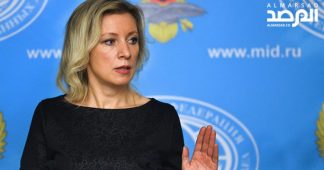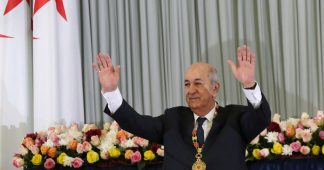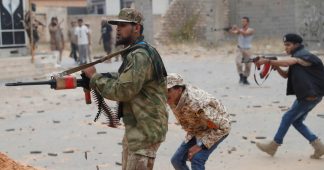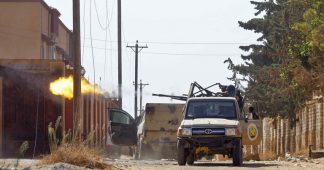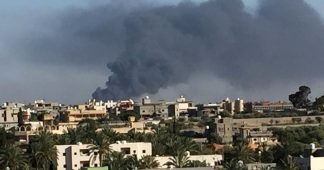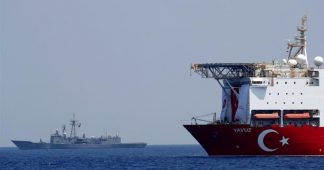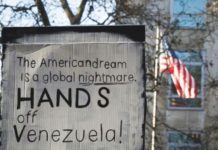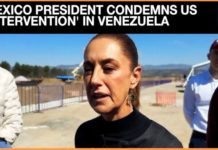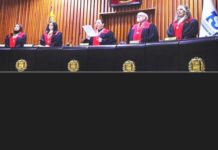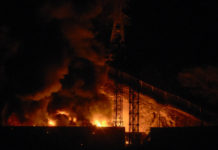Jun 22, 2020
The United States is paying increasing attention to the conflict in Libya. Although Washington is not currently a key external actor in the events, it is working hard to change that fact. The US Africa Command is becoming more active in Libya – both by exposing the alleged Russian supply of aircraft to the Libyan National Army and by agreeing to strengthen its military presence in Libya’s neighboring Tunisia. Presidents Recep Tayyip Erdogan and Donald Trump discussed the situation in Libya over the phone.
However, what will the US’ policy be in Libya, what can they offer the country, and how will they interact with its domestic and foreign players? To find out, let us turn to the recommendations of American think-tanks which prioritize foreign policy.
Of course, these are not official government plans, but real political decisions are largely based on the expertise of such organizations. Let us consider what common features are characteristic of American experts’ understanding of the situation in Libya. Most likely, American policy will be conducted in this vein, and specific proposals made by the experts may already be embodied in the initiatives of the State Department or the President.
To counter Russia and Turkey
On June 17, Henri Barkey, adjunct senior fellow for Middle East studies at the Council of Foreign Relations and foreign member of the US State Department’s policy planning staff wrote an article criticizing Turkish involvement in Libya and the “Blue Homeland” doctrine.
In the article he argues that the US should pay attention to the region:
“A new crisis, therefore, is brewing and unless Washington starts paying attention, it could mutate into yet more, wholly avoidable, long-term discord”.
In January 2020, an article “How to Stop Libya’s Collapse” was published in the journal Foreign Affairs, a product of the most authoritative globalist Think tank – the Council on Foreign Relations. The article was written by Frederic Wehrey, a Senior Fellow at the Carnegie Endowment for International Peace and Jalel Harchaouli, a Research Fellow specializing in Libya at the Clingendael Institute, The Hague.
The authors of this analytical material are in favor of active US intervention in Libyan affairs and consider it necessary to oust all other players, primarily Turkey and Russia, from Libya:
“Only by clearing the battlefield of foreign meddlers-including the UAE, Turkey, and Russia-and providing the space for economic recovery can the United States reverse Libya’s dangerous slide toward disintegration”, they state.
For the authors, Libya is an opportunity for the United States to demonstrate its “leadership role” in a region marked by multipolarity and increasing defiance of the West. At the same time, they, like other US experts, do not rule out the situational use of certain external actors in the Libyan conflict.
The Jewish Institute for National Security Affairs (JINSA), one of the most influential institutions of the Israeli lobby in the country, speaks even more openly about the need to push Russia and Turkey out of Libya.
Report “Turkey’s Escalation in Libya: Implications and US Policy Options” focuses on Turkey’s “negative” role in the Libyan conflict, which “imperils US interests in promoting peaceful regional energy development”.
“Now is the time for the United States finally to assume a much-needed and long overdue role in ending or mitigating the spiraling proxy conflict in Libya. The United States should enhance its naval presence in the region writes large – including through stronger US defense cooperation with Greece – and appoint a Special Envoy for the Eastern Mediterranean to devise a negotiated solution to the Libya conflict and address related security concerns, including Turkey’s destabilizing projection of power in the region”, the report underlines.
In December 2019, the neo-Conservative (and pro-Israeli) Washington Institute published an article calling on the United States to confront Russia in Libya. According to the authors, a special role in this process should be given to the Arab allies of Haftar.
“The best way to curb Moscow’s interference is not by cooperating with Haftar, but rather by pushing his other backers, mainly the UAE and Egypt. These countries seek positive relations with Washington, and this desire should be used as leverage to extract their support for the Berlin process and a much-needed ceasefire”.
The authors of the article were Ben Fishman, a Senior Fellow at the Washington Institute’s Geduld Program on Arab Politics and Soner Çağaptay, an expert on Turkey at the Washington Institute.
On June 10, 2020, Ben Fishman called on the US to begin a dialogue with all parties to the conflict and to “prevent a Turkish-Russian accommodation that establishes its presence in Libya indefinitely”.
The author believes that the United States should act on three fronts: “…just watching the diversification of political voices in the east, exposing violations of the UN arms embargo, and talking with Turkey and Russia to help manage their withdrawal from Libya. “
In the latter case, Fishman openly proposes “Preventing a Russia-Turkey deal”.
Washington is expected to negotiate with both Ankara and Moscow to prevent both countries from concluding an alliance that would jeopardize US interests.
In May 2020, Jonathan M. Winer, the former US special envoy for Libya and now a scholar at the Middle East Institute (MEI) said that the UN plans (now a special representative of the secretary-general for Libya is Stephanie Williams – former US ambassador to this country) should become the basis for the settlement of the conflict in Libya.
“The US could play an important role in achieving an agreement to strengthen the UN process and combat foreign military involvement in domestic Libyan affairs through confidence building measures to assure the foreign patrons that a unified Libyan government would not be dominated by any other foreign state,” the former diplomat said.
According to him, “it is far from certain that Russia, Turkey, Egypt, and the UAE would accept this result,” but the US can also convince some powers that the Americans will help them not to lose their position in Libya. In this way, the US can play on the contradictions of the external players in the Libyan conflict.
Disintegration and Occupation
What can the US offer Libya if it succeeds in displacing Russia and Turkey and in marginalizing other players? In February 2019, Brookings Institution together with Foreign Policy Magazine presented the report “Empowered Decentralization: a City-based strategy for rebuilding Libya”
In this paper, American experts called on Washington to return to Libya, “because of its key role in the dangerous crescent of land stretching west through the Maghreb and south into the Sahel regions of North Africa, to the Middle East and South Asia”. Americans are particularly concerned about the rising role of the Russians.
“As part of a new initiative, the United States should restore an on-the-ground diplomatic and development presence in Libya,” the report says. – We propose a new US approach to Libya that centers on the concept of reinvigorated American engagement”.
American experts believe that the US should radically change the approach to the Libyan issue. Instead of fighting for the unity of the country, the Americans should support its continuing fragmentation into separate “city-states” with their armed units.
“We propose a city-first paradigm that would not be a radical departure relative to realities on the ground today, or to the expressed wishes of many Libyans. Rather, it would constitute a significant shift in formal strategy and in political horizon or vision. It would only make sense if and when most major Libyan actors-current government officials, major militia leaders, technocrats in the current government, and other individuals committed to the country’s future-would endorse such a shift in approach,” the American experts write.
According to the report, this redistribution of power will make Libya more stable. However, it ignores the fact that for a large part of the population, especially in Tripoli, as the study of British Chatham House shows, would prefer a stable state.
Libyan armed groups are active participants in the regional black economy and are closely linked to the criminal world, they are structures that parasitize the war and wealth of Libya and create a breeding ground for extremism and terrorism. The recipes that Americans offer to control militias and the flow of money to them are unrealistic within their own paradigm. Someone should control and check local militants. The US is offering to increase the influence of the international community. De facto, this would mean that foreigners would have a legal opportunity to buy up the interests of local authorities and militias.
Thus, the US plans to consolidate the fragmentation of Libya and use local municipalities and security forces to consolidate influence there.
However, effective control of cash flows is impossible without some kind of force on the ground that could influence uncontrolled militants and possible terrorists.
Therefore, the Americans speak about the need for some external force under the UN flag to interfere in Libya’s affairs.
“Several among our group of authors, while endorsing all of the above ideas, also believe that the prospects for a new strategy in Libya would be very significantly enhanced by the authorization and deployment of a UN-sanctioned security force, assuming a request for such a force has been issued by key Libyan actors. Given Libyan national pride and patriotism, that force should have a narrow mandate focused on protecting specific assets, assets, locations. But it would have to be granted robust rules of engagement for self-defense, in order to be effective,” the American report notes.
Rather, this plan should be seen as a way to legitimize other provisions of the same report. First of all, the US strategic return with the US embassy resembling a fortress or even a military base.
Attention to oil and to the south
The US Institute of Peace (USIP) is another American think tank that draws considerable attention to the situation in Libya. We have already written about the report of this think tank, which focuses on the southernmost region of Libya – Fezzan.
The practical meaning of the report can be expressed in two phrases: Control over Fezzan oil and training of militants.
“The US should pay more attention to Libya’s south as it is crucial to the country’s stability”, the report emphasizes. Developments in Fezzan have proven central to key US interests: oil and fighting terrorism, as well as irregular migration, which disproportionately affects US European allies. So the American think tank suggests the US focus on “local-level security” and training of local security forces. USIP analysts also argue that “To keep the flow of oil, build peace” is important for the US.
It is indicative that the US Institute of Peace has programs in Libya aimed at engaging with local communities.
Calls for intervention
The Atlantic Council draws attention to Libya in the context of the confrontation between Russia. At least one nonresident fellow – Emadeddin Badi – has a positive attitude towards Turkey and the Muslim Brotherhood. In general, the Atlantic Council prefers to support the Government of National Accord (GNA).
However, this center is also characterised by the mood to display the current players.
In May 2019, The site of the Atlantic Council gave the voice to tank Mustafa Abushagur (he Chairman of the Libyan Policy Institute, Former Deputy Prime Minister of Libya (2011-12) and Member of the Libyan House of Representatives (2014-17), who sought the American Intervention. He asked American to intervene:
“The only possible way to end this senseless war is if the international community, under the leadership of the United Nations with serious concerns from the United States and the United Kingdom, intervenes by compelling Haftar to stop his attack on Tripoli and withdraw the remainder of his forces to their original barracks”.
In June 2010, the experts of the Atlantic Council declared that the only way to bring peace to Libya is “to return to a UN-proposed solution supported by non-aligned states”.
In another revealing speech, Atlantic Council expert and former US ambassador to the United Arab Emirates, David Mack, warns the UAE and Turkey of “risking the firmness of their national security partnership with the United States”.
Also, it is indicative that the former US diplomat seeks to preempt the appearance of a possible negotiation format between Turkey, Egypt and Russia.
In particular, he states that “Safe havens for terrorism and other forms of lawlessness would emerge from the spheres of influence that Egypt, Russia, and Turkey hope to gain. What has happened in Syria is instructive”. At the same time, it is indicative that he excludes Russia from the list of countries with which, according to him, the US should conduct negotiations on Libya.
On June 14, in an interview with Al Arabiya, Richard Weitz Director, Center for Political-Military Analysis of the Hudson Institute, said that the US does not see more difference between the Russian and Turkish actions in Libya. However, according to his statement the main priority for the US is to avoid Russia to engage militarily in Libya (like in Syria). This, he said, would create problems on the southern flank of NATO.
On March 27, the neoconservative Heritage Foundation issued the report “US Diplomatic Heft Required in Libya?”, written by Joshua Meservey (the Senior Policy Analyst for Africa and the Middle East at the Heritage Foundation).
He, like other US analysts, believes that the main concern for America is the potential for Russia to consolidate itself in Libya. This, he said, requires more aggressive US diplomacy in that country. https://www.heritage.org/global-politics/report/us-diplomatic-heft-required-libya.
In an apparent attempt to draw the attention of the Donald Trump administration, Joshua Meservey states that “US leadership on Libya does not require troops or money. It requires American attention and diplomatic influence.” In the expert’s opinion, two principles should underpin the American approach to Libya:
1) Coordinating the activities of countries with the exception, of course, of Russia in Libya.
2) Supporting competent municipal governments – instead of national bullying (the strategies that the US pursued in Iraq and Afghanistan) – and working with local groups.
If we sum up the proposals of American think tanks regarding possible American policy in Libya, it is not difficult to notice that all proposals have common features. US experts are extremely concerned about Russia’s influence and the prospects for strengthening the Russian military presence in this country. A little less, but still worried about their presence in Turkey. Americans are sharply against the implementation of the Blue Homeland doctrine and the growth of Turkish influence in the Eastern Mediterranean. The US considers the Moscow-Ankara and Ankara-Moscow-Cairo negotiation formats dangerous, and is determined to disrupt them.
For the US, Libya is a strategic point that it would not want to give in to other powers. Washington intends to achieve this mostly by using diplomacy tools, breaking dangerous alliances and negotiation formats for Americans. At the same time, Americans do not rule out the entry of their troops into Libya under one pretext or another.
An important direction that American experts note is the readiness to work with local municipalities, local militias, including training of specific security forces. This is the direction that the Americans are developing in Syria, supporting the structures of separatists YPG or militias on the base of At-Tanf. Instead of national building (failed in Afghanistan and Iraq) – they support the fragmentation of the country and promoting their interests using local forces. All of this, however, does not exclude parallel work with state structures in both the West and East of Libya.
